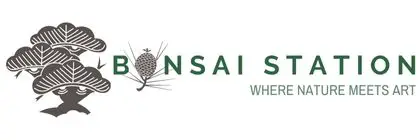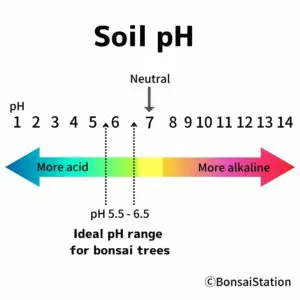What kind of water is best for your bonsai trees depends on where you live and the quality of water you get. But you might be wondering which is the better choice without fail.
Rainwater is always the first choice for irrigating bonsai trees because it is most likely acidic and fits within the optimum soil pH range of bonsai trees’ growth. Using tap water for bonsai irrigation should be avoided because it may have high alkalinity that hampers trees’ growth.
Water quality and bonsai
Water quality: pH and alkalinity
Alkalinity and pH are two important factors in determining the suitability of water for irrigating bonsai trees. Alkalinity of water and alkaline (=basic) water are two very different things.
What is pH?
The term pH (“potential of Hydrogen”) is a measurement to scale acidity or basicity of a substance (sometimes the term “alkaline” is used instead of “basic”). The pH scale varies between 0 and 14, in which
- a pH value of less than 7.0 is acid,
- a pH value greater than 7.0 is alkaline, and
- a pH of 7.0 is neutral.
When the scale is closer to zero, the substance is highly acidic, and when the scale is closer to 14, it is highly basic (alkaline).
What is alkalinity?
Alkalinity is the capacity of water to resist acidification or neutralize acids. It is a property of water that is defined by the presence of certain chemicals in the water, such as bicarbonates, carbonates, and hydroxides.
The desirable range for irrigation water is 0 to 100 ppm calcium carbonate. Levels between 30 and 60 ppm are considered optimum for most plants.
Water quality and bonsai trees’ growth
Why is alkalinity of water important for bonsai?
Water with high alkalinity always has a pH value of 7 or above, but water with high pH does not always have high alkalinity. This is important because high pH water (alkalic water) does not necessarily affect plant growth but water with both high pH and high alkalinity does.
In most cases, irrigating with water having a high pH causes no problems as long as its alkalinity is low. It is the combination of high alkalinity and high pH that has the most significant effects on soil fertility and plant nutrition.
This is because the pH of soil may increase significantly with time if water with both high pH and high alkalinity is used for irrigation. This is particularly exacerbated for plants grown in small containers such as bonsai pots whose volume of soil has little, if not no, buffer to pH change.
Soil pH and bonsai tree growth
Soil pH is one of the key factors in the sound growth of bonsai trees because it influences nutrient uptake of the trees. Many nutrients change their form in reactions to other chemicals in the soil, which are largely controlled by soil pH. Trees may or may not be able to use nutrients when they change form.
Most plant nutrients are optimally available to plants in general within 6.5 to 7.5 pH range, which is generally compatible with root growth as well. For the majority of bonsai tree species, soils with a pH between 5.5 to 6.5, meaning slightly acidic soil, generally provide the best growing conditions.
Rainwater and bonsai irrigation
pH of rainwater in US
Rainwater has long been very acidic due to human activities such as coal-burning power plants, factories, and automobiles. But over the past 2 decades or so, it has been getting better and better. Acidic precipitation, rain or snowfall with a pH value of 5.1 or less, decreased in both frequency and concentration over the 25-year span.
(Source: Annual Data Summaries, National Atmospheric Deposition Program, 1997/2020)
Typically, a precipitation pH of less than 5.1 is considered acidic. In 1997, only around 1/5 of the country had “normal” rains (in light green). All of the eastern US in red and light yellow color had acidic rains with pH of 5.1 or less.
In 2020, on the other hand, all of the regions are in dark green and no data points had acidic rain.
Is rainwater good for bonsai?

Rainwater is always the first choice for irrigating bonsai trees.
Rainwater nowadays has an acceptable level of acidity of around pH 5.5 for the irrigation of bonsai trees. As mentioned earlier, for the majority of bonsai tree species, soils with a pH between 5.5 to 6.5 generally provide the best growing conditions, and rainwater fits within this range.
Rainwater is also free. You can gather as much as you want for no charge.
The only downside of using rainwater in watering bonsai trees is its storage. If your climate does not allow you to collect enough water before summer, water can run out when it is most needed by bonsai trees. And stored water may have bacteria and algae growing in it, which is not good for the trees’ health.
Tap water and bonsai irrigation

pH of tap water in US
Tap water can theoretically be acidic, neutral or alkaline, depending on the source of water.
The U.S. Environmental Protection Agency (EPA) is in charge of monitoring public drinking water quality in the United States. Although pH of water is a guideline and not enforceable, EPA requires that municipal drinking water suppliers keep their water at a pH of between 6.5 to 8.5.
Public water sometimes is treated to be alkaline to protect metal pipes from corroding and can have a higher pH level than the source water. This means that US tap water tends to be more basic (alkaline) than acidic.
Alkalinity of tap water in US
What affects alkalinity of water?
In a surface water body, such as a lake, the alkalinity in the water comes mostly from the rocks and land surrounding the lake. Precipitation falls in the watershed surrounding the lake and most of the water entering the lake comes from runoff over the landscape.
If the landscape is in an area containing rocks such as limestone, then the runoff picks up chemicals such as calcium carbonate, which raises the pH and alkalinity of the water.
Source of tap water in US
According to the U.S. Geological Survey (USGS), the source of public water in the US typically is surface water from rivers, lakes, reservoirs, or groundwater, which is treated and then delivered to consumers.
Alkalinity of surface water in US
The map below is made by EPA, which shows alkalinity of surface waters in the US. It is based on alkalinity data from approximately 39,000 lake and stream sites. As seen in this map, many US regions’ surface water has high alkalinity (those areas in light yellow).
(Source: USGS)
This coincides with the map of soil pH in the US below. Regions with high pH (alkalic soil) in greenish blue to blue color closely match the light yellow part of the high alkalinity areas in the map above because the high alkalinity of surface water comes from the rocks and land (that makes soil) surrounding the water pool.
(Source: Oregon State University)
Alkalinity of tap water in US
Since most of the tap water comes from surface or groundwater and many regions’ surface water has high alkalinity, it is likely if not always, that your tap water is inclined to have some degree of alkalinity.
Though it cannot be said definitively without individual testing by lab, tap water in the US may have higher alkalinity than it should be for irrigating bonsai trees.
Is tap water good for bonsai?

As mentioned earlier, the soil pH in your bonsai pots may increase significantly with time if water with both high pH and high alkalinity is used for irrigation. If you are not sure if the tap water from your water supplier does no harm to your bonsai trees, meaning your tap water has both neutral-approximate pH and low alkalinity, it is better to avoid using tap water for your bonsai trees.
Remember that keeping the soil pH within the right range is essential for bonsai trees’ sound growth.
Other types of water and bonsai irrigation
Distilled/purified water

How distillation works
Distillation is the process of separating substances from a liquid mixture by boiling and condensing. First, contaminated water is heated to form steam. Inorganic compounds and large non-volatile organic molecules do not evaporate with the water and are left behind. The steam then cools and condenses to form purified water.
Distillation effectively removes inorganic compounds such as metals (lead), nitrate, and other nuisance particles such as iron and minerals from water. The boiling process also kills microorganisms such as bacteria and some viruses.
Is distilled/purified water good for bonsai?
As distillation removes all impurities, distilled water does not harm bonsai trees directly. Distilled water can be used as a replacement for rainwater when it is not available.
Its continued usage, however, might not be a good idea because those “impurities” include minerals that bonsai trees need to grow. This lack of essential minerals has to be replenished by adding extra fertilizers which you would not need if rainwater is used.
Mineral/bottled water

Mineral or bottled water can be used temporarily but continued usage is not advisable for bonsai irrigation.
The quality of mineral or bottled water varies. It can be sourced from a natural spring without any treatment, or sourced from a natural spring but treated afterward. Or it can just be purified tap water bottled in a factory.
Even if it is untreated natural spring water, you do not know if the minerals in the water are what your bonsai trees need. It can contain some minerals with much higher density than necessary or simply unwanted minerals.
—–
References
“Distillation for home water treatment“, Purdue University.
“Alkalinity and water“, USGS.
“Water quality: alkalinity and pH“, University of Massachusettes Amherst.









